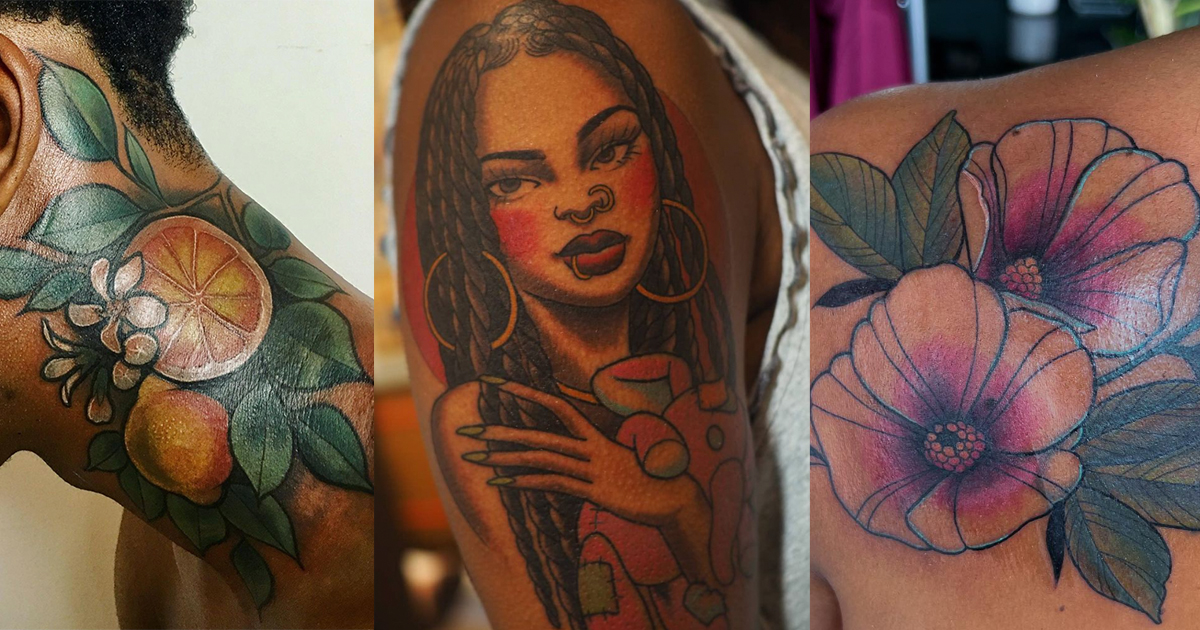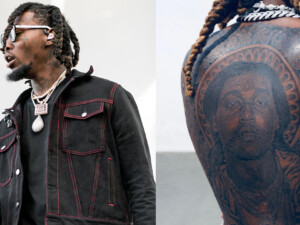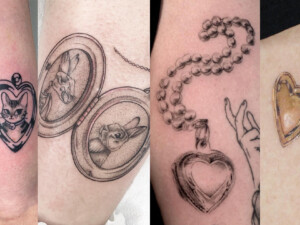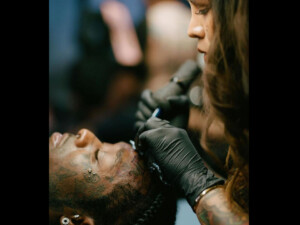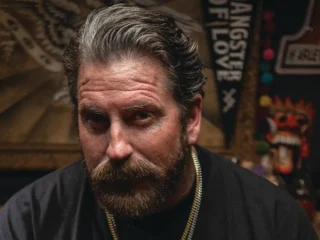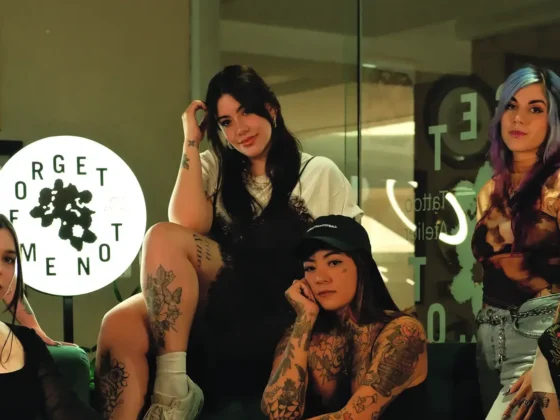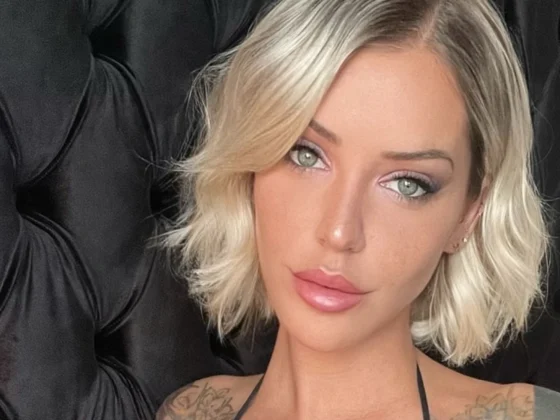Sophia Tan
February 23rd, 2023
Black Tattoo Artists On Tattooing Dark Skin
Black tattooers refute the myth that you can’t tattoo darker skin well
Not enough tattoo artists showcase work on Black skin. A quick scroll through the “#tattoo” hashtag on Instagram will deliver almost entirely tattoos done on white skin. Though tattooing has evolved from acts of adornment and status symbolization in ancient Egypt, Polynesia and a number of other African cultures, the modern industry within the United States was historically dominated by white tattoo artists. As a result, rumors and misconceptions have pervaded the scene about tattooing on dark skin. We’d like to give the mic to Black tattoo artists to share their first hand experiences in encountering these myths, changing the way in which we discuss tattooing darker complexions and how Black clients can find trustworthy artists.
Atlanta-based tattoo artist Kandace Layne, who has been tattooing for over 10 years, found photos of tattoos on Black skin to be few and far between when discovering the industry. Instagram came about a year into her apprenticeship, and when looking at artists’ pages she “didn’t see anybody that looked like [her].” “It’s like shopping,” she says. “If you’re a bigger person and you’re trying to buy something, and all the mannequins are skinny, how would you know how [something] is gonna look on you? With tattooing, it’s even worse because somebody can traumatize your skin really badly.”
View this post on Instagram
Genesis, an artist based in New York, shares similar thoughts. “When I first got into the tattoo industry, I did see people who had tattoos that were of a darker complexion, but they weren’t necessarily well-done,” she says. “I grew up in the hood—a lot of people I grew up around had tattoos that were done in someone’s apartment, kind of like those street shops that don’t necessarily practice ethical care or have that much education.” When artists aren’t exposed to quality work on people who look like them in their research or daily life, it’s easy to question the collective state of the industry.
View this post on Instagram
“Anybody I’ve talked to who has tattooed a person of a darker complexion, they struggle with the stencil paper because it’s blue in color,” Genesis says. “Depending on how dark a person’s skin tone is—if there’s red tones or darker tones—sometimes it’s harder to read the stencil on skin.” The artist adds, “There’s this misconception that darker skin hides people’s mistakes, so people don’t put in as much effort.” Despite growing up in a Black community, Atlanta-based tattooer Debbi Snax would also hear chatter about what could and couldn’t be done on Black skin. “Whenever my friends would go over to other shops, they would be like, ‘They said the only color I can get is red,’” she says. “Or that the artists had to turn their machines up because they were tattooing on darker people. None of that stuff made sense to me.”
View this post on Instagram
While certain guidelines exist for properly tattooing dark skin, they shouldn’t pose an issue to experienced artists. A skilled artist understands that making the proper adjustments to accommodate any skin tone is just part of the job. “If I’m an artist and if I myself am a person of color,” Genesis says, “it’s my obligation to learn how to do so. It’s more about the application and how you set things up. Also the right lighting, and being patient enough to not rush the process so you can legibly see what you’re doing.”
Regardless of skin tone, every individual is going to pose unique challenges when it comes to getting tattooed, and it’s the responsibility of the tattooer to know how to adapt to these challenges. “I don’t think it’s a skin tone thing, I think it’s a skin type thing,” Snax explains. “All skin is different. It really depends on how the person takes care of their skin, because I’ve had a lot of white people [come in] who were heavy smokers, and their skin was harder to tattoo than a Black person.”
View this post on Instagram
Because many artists use social media to promote their work, taking high-quality pictures of their finished pieces is a vital aspect of the job. “I will say tattoos on lighter skin do look better in the initial photos,” Snax says, “but if you’re willing to wait that extra moment, you can still get great photos of things on darker tones.” If anything, the inability to tattoo and photograph a variety of skin tones is a disservice to artists themselves, losing out on an entire demographic of potential clientele.
Changing the way we talk about tattooing Black skin can bring the industry one step closer to being a more inclusive community. “I don’t think [the misconceptions] are necessarily inaccurate information, I just think there’s a bit of generalization in the way we use the dialect,” Genesis says. “An example of this would be like, ‘Black people can’t get color tattoos.’ No, they can. It’s just that you have to work with certain tones.” Depending on a person’s melanin composition, whether there are more yellow or red tones in their skin, a special palette can be created for that individual to compliment their tone.
View this post on Instagram
If an artist doesn’t have much experience tattooing darker skin and is looking to develop that skill, there are a few ways to go. “I think maybe the first step is just connecting with Black tattooers and looking at their work,” Layne says. “And following Black tattooers so you can see tattoos on Black skin, because I think a lot of people’s Instagram feeds are mostly tattoos on white people.” Layne also stresses that when attempting to tattoo skin tones that artists have never worked with before, the most important thing is being transparent with the client about where they’re at in their experience level.
Though things are changing in the industry, Snax says people of a darker complexion still “don’t have the luxury of just going anywhere and getting tattooed,” as many artists still operate with the misconceptions they’ve blindly accepted. For clients seeking their first tattoo with an artist they can trust, Layne recommends finding someone who has a style they like, and consulting their portfolio for tattoos done on their skin type. “It’s kind of tricky, but if you can find somebody that has people who look like you on their page, that’s what I’d do [before getting tattooed],” she says.
View this post on Instagram
People who tattoo on darker skin tones and post them don’t get as much attention as they should. “I hate that that’s the reality, but it is,” Snax says. “On Pinterest, it definitely is more lighter tone, lighter skin things. The algorithm is set up for ‘what’s white is right.’ That’s just the way this whole country is.” But the reality is, Snax reassures us, there is an abundance of fantastic tattoos done on Black and brown skin that just don’t get enough notoriety. “There’s a lot of Black tattooers who are really killing it, and deserve the nominations and the accolades that are given to people who stole this craft from us.”
On that note, we’ve created a gallery of stunning tattoos done by Black artists on Black skin. Follow and support these artists whose work deserves more shine.
KANDACE LAYNE
View this post on Instagram
View this post on Instagram
View this post on Instagram
View this post on Instagram
View this post on Instagram
GENESIS
View this post on Instagram
View this post on Instagram
View this post on Instagram
View this post on Instagram
View this post on Instagram
DEBBI SNAX
View this post on Instagram
View this post on Instagram
View this post on Instagram
View this post on Instagram
View this post on Instagram
ANGELO SARACINA
View this post on Instagram
View this post on Instagram
View this post on Instagram
View this post on Instagram
View this post on Instagram
VEGAS
View this post on Instagram
View this post on Instagram
View this post on Instagram
View this post on Instagram
View this post on Instagram
INKTOPIA
View this post on Instagram
View this post on Instagram
View this post on Instagram
View this post on Instagram
View this post on Instagram
KAL
View this post on Instagram
View this post on Instagram
View this post on Instagram
View this post on Instagram
View this post on Instagram
BRITTANY
View this post on Instagram
View this post on Instagram
View this post on Instagram
View this post on Instagram
View this post on Instagram
TEE
View this post on Instagram
View this post on Instagram
View this post on Instagram
View this post on Instagram
View this post on Instagram
CAKE
View this post on Instagram
View this post on Instagram
View this post on Instagram
View this post on Instagram
View this post on Instagram
AARON DAVIS
View this post on Instagram
View this post on Instagram
View this post on Instagram
View this post on Instagram
View this post on Instagram
SAM DAVEENA
View this post on Instagram
View this post on Instagram
View this post on Instagram
View this post on Instagram
View this post on Instagram
WES HOLLAND
View this post on Instagram
View this post on Instagram
View this post on Instagram
View this post on Instagram
View this post on Instagram
DANGER DAVE
View this post on Instagram
View this post on Instagram
View this post on Instagram
View this post on Instagram
View this post on Instagram
MIRYAM LUMPINI
View this post on Instagram
View this post on Instagram
View this post on Instagram
View this post on Instagram
View this post on Instagram
DOREEN GARNER
View this post on Instagram
View this post on Instagram
View this post on Instagram
View this post on Instagram
View this post on Instagram
OBA JACKSON
View this post on Instagram
View this post on Instagram
View this post on Instagram
View this post on Instagram
View this post on Instagram
JALEN
View this post on Instagram
View this post on Instagram
View this post on Instagram
View this post on Instagram
View this post on Instagram
Editor's Picks
Offset Gets a Full Back Portrait In Memory of Takeoff
Offset covered his back with a heartfelt portrait honoring his late cousin
Lovely Locket Tattoos
Lockets are symbols of eternal sentimentality, which make for equally enchanting tattoos
Lil Uzi Vert Reveals Elegant Forehead Tattoo
The flashy trap artist has been on a streak of perplexing tattoos

